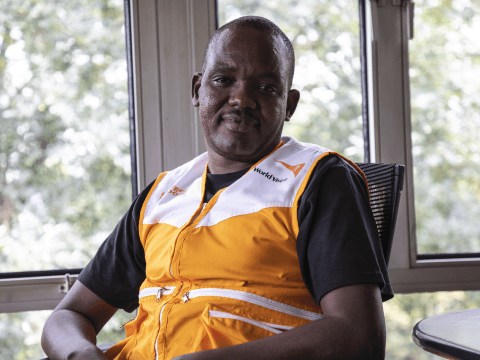#HiddenHero: Freddie is an embodiment of passion, excellence and empathy

The COVID-19 pandemic has been hard on most humanitarian agencies, testing their quest to help the most vulnerable communities, causing a shift in operations. The restricted movements, ban on large gatherings and border closure have made it hard for humanitarians to respond to those most in need.
Nevertheless, most humanitarian workers at the forefront in the fight against the pandemic, have had to take swift action and adapt quickly to the new normal to continue serving the communities in which they work.
On April 2, World Vision launched Phase 1 of its Uganda COVID-19 emergency response worth US$ 1,010,000 to support refugee communities in West Nile and the 53 districts where the organisation operates across the country. A committed, enthusiastic and people-focused leader was therefore essential in steering the response team and successfully executing the COVID-19 response plan. That #HiddenHero for Uganda is Freddie Opoka, the Associate Director Operations, who also doubles as the COVID-19 Response Lead.
Response intervention
“The response started in mid-March with activities that were initially aimed at limiting the spread of COVID-19. This included community awareness on preventive measures, provision of hygiene equipment and supplies to health institutions, provision of personal protective equipment to medical workers and advocacy for continuity of health services for children,” Freddie shares.
He adds: “We are currently implementing the COVID-19 response in 52 districts with the goal of limiting the spread of the virus and supporting children, their families and communities to adapt during and post COVID-19.”
World Vision's Uganda COVID-19 response majorly focuses on Water, Sanitation and Hygiene (WASH), health, livelihoods, education and child protection with an aim to support 5 million children, their families and the communities in which they live.
“The intervention has so far reached over 800,000 people directly with 245,000 of them being children. We have worked with 1,689 faith leaders to disseminate preventive measures for COVID-19 and provided psychosocial support to affected children and their families,” Freddie notes. “Over 11,000 health workers have been trained and supported to provide community-based services such as home support and contact tracing. We have provided personal protective equipment to over 4,000 medical workers and supported the Government in establishing 60 quarantine centres and over 18,000 children have been supported with child protection programming.

Inspired to create change
“I am generally inspired by positive change in the lives of beneficiaries; especially the children. Whenever I have gone to the field and hear the stories of positive change that our different interventions have had in the lives of children, I am moved and motivated to even do more,” he says.
Freddie takes pride in the fact that World Vision has excelled in supporting the Ugandan Government’s efforts to limit the spread of the virus: “The Government, civil society and the communities with which we work have applauded us for the timely support we have been providing right from the start in fighting the pandemic.”
However, the task to reach communities during lockdown comes with several challenges: “Government restrictions on the number of people that can congregate in one area, though a good measure for limiting the spread of the virus, is making the implementation of response interventions more expensive and hectic. The lockdown also led to the shutting down of a number of services; hence preventing children from accessing services like immunisation outreaches, child and family courts and child protection call centres,” he explains.
Staff safety a priority
“The National Office has developed Standard Operating Procedures aimed at keeping all staff safe from possible infection. Staff have also been provided with basic protection such as face masks and hand sanitisers as they execute their roles. Visits to World Vision offices are restricted during this time, with only essential visits on appointment permitted and staff with symptoms similar to those of COVID-19 asked to stay at home,” Freddie adds.
Jeremiah Nyagah, World Vision's Operations Director from Uganda, says passion and excellence define Freddie’s work culture and ethics: “When the National Director settled on him after my recommendation as COVID-19 Response Director for World Vision in Uganda, I had no doubt he was going to deliver on the challenging assignment. Thus far, he has not disappointed,” Jeremiah says.
“Uganda has continued to shine within the World Vision Partnership as relates to COVID-19 response achievements, courtesy of his [Freddie’s] steady leadership. As his supervisor, I am very proud of his achievements and I can dare say "mbele iko sawa” [Swahili for 'the future is bright'] with Freddie. Well done Freddie and keep the passion and fire burning with excellence for the wellbeing of children of Uganda and for the glory of God,” adds Jeremiah,

Fact file
Freddie was born in 1980, in Northern Uganda. He is married to Maggie Ekit, and the couple has four children. He has been working with World Vision for 14 years, with his initial posting as a development facilitator.
-----
By Derrick Kyatuka, Communications Officer, Uganda Refugee Response